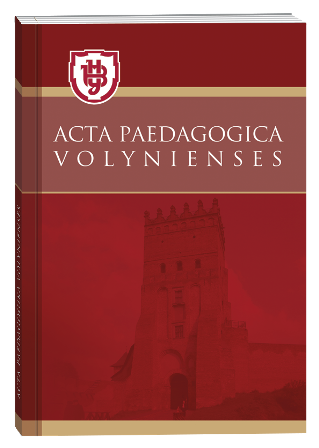THE MODEL OF FORMATION OF PROFESSIONAL TRAINING OF FUTURE POLISH LANGUAGE TEACHERS BY MEANS OF INFORMATION AND COMMUNICATION TECHNOLOGIES
DOI:
https://doi.org/10.32782/apv/2025.3.15Keywords:
model, professional training, Polish language teacher, information and communication technologies, digitalizationAbstract
The article presents the author’s model for the formation of professional training of future Polish language teachers through information and communication technologies. The model consists of three blocks: the goal-methodological block (goal, approaches, principles), the content-organizational block (stages, content, forms, technologies, methods, tools), and the evaluation-resultative block (criteria, indicators, levels, diagnostic tools, result). The content of each component of the model is described in detail. Within the goal-methodological block, the main approaches to model implementation are defined, and the key principles ensuring its coherence and effectiveness are formulated. The content-organizational block outlines the stages of implementation, and identifies forms of organizing the educational process, technologies, methods, and tools that contribute to the development of professional training of higher education students. Special attention is paid to the use of information and communication technologies as a factor in modernizing the educational process, enabling the integration of traditional and digital components of training. Each stage of the model's implementation is characterized, and the didactic principles of integrating ICT into the educational environment of higher education institutions are outlined. Within the evaluation-resultative block, the criteria (motivational-value, cognitive-informational, operational-activity), indicators, and levels of professional training (high, medium, low) of future Polish language teachers are defined. The diagnostic tools enabling the tracking of progress and effectiveness of the proposed model are presented. The results of implementing the model in educational practice confirm its positive impact on the quality of students’ professional training in the context of digitalization of higher education. The model is concluded to be a comprehensive, coherent, and dynamic system aimed at enhancing the effectiveness of professional training for future Polish language teachers.
References
Бобрицька В., Процька С. Модель формування професійних компетентностей майбутніх філологів засобами комп’ютерно орієнтованих технологій. Інформаційні технології і засоби навчання. Том 58, № 2. 2017. С. 59–66.
Зязюн І. А. Сучасні дидактичні моделі і логіка учіння. Сучасні інформаційні технології та інноваційні методики навчання у підготовці фахівців: методологія, теорія, досвід, проблеми : збірник наукових праць. Київ ; Вінниця : ТОВ фірма «Планер», 2000. С. 4–7.
Клак І. Моделювання процесу формування професійної комунікативної компетентності у майбутніх учителів філологів. Педагогіка і психологія професійної освіти. № 5. 2013. С. 58–67.
Костікова І. І. Теоретико-методичні засади професійної підготовки майбутніх учителів іноземних мов засобами інформаційно-комунікаційних технологій : автореф. дис. на здоб. наук. ступеня д-ра пед. наук : спец. 13.00.04 – теор. і метод. проф. осв. ; Харків. нац. пед. ун-т ім. Г. С. Сковороди. Харків : ХНПУ, 2009. 34 с.
Поселецька К. А. Підготовка майбутніх учителів філологічних спеціальностей до професійної самореалізації : дис.. ... кандидата пед. наук: 13.00.04. Вінниця, 2016. 339 с.
Сорока О. В. Теоретичні і методичні засади підготовки майбутніх учителів початкової школи до використання арт-терапевтичних технологій : дис. ... д-ра пед. наук : спеціальність 13.00.04. Тернопіль, 2016. 534 с.
Цехмістрова Г. С. Основи наукових досліджень : навч. посіб. К. : Слово, 2003. 240 с.








